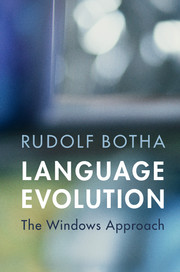11 - Comparative animal behaviour
from Part IV - Abduction windows
Published online by Cambridge University Press: 05 March 2016
Summary
Darwin's window
Charles Darwin, as we have seen in Section 10.4.2.2, cited evidence derived from comparative animal behaviour in support of the abductively inferred musical protolanguage hypothesis. He observed, for instance, that though the capacity for complex vocal learning is unusual among mammals, humans share it with many birds. As noted by Tecumseh Fitch (2013: 490), this reflects the fact that Darwin ‘exploited a wide comparative database, drawing on not just knowledge of nonhuman behaviour, but also insights from many other vertebrates’. And it instantiates, according to Fitch, Darwin's use of comparative animal behaviour as a window into language evolution.
Like other windows on language evolution, that provided by comparative animal behaviour – ‘the animal window’, for short – has more than one variant. Important among these is the one variant used for investigating whether the human language faculty has components that are unique to it. The present chapter examines this variant: it provides a further illustration of the use of abductive inference in the investigation of language evolution.
What makes the uniqueness variant of the animal window even more interesting is that leading scholars have come up with radically different assessments of its heuristic potential. For instance, in an important article published in 2002, Marc Hauser, Noam Chomsky and Tecumseh Fitch express a distinctly favourable view of the comparative method as a framework for addressing questions about the evolution of language. More specifically, they assert that:
A more tractable and, we think, powerful approach to problems of language evolution is provided by the comparative method, which uses empirical data from living species to draw detailed inferences about extinct ancestors. (Hauser et al. 2002: 1572)
In line with the view expressed in this quotation, they conclude their article by asserting amongst other things that:
we believe that a comparative approach is most likely to lead to new insights about both shared and derived features, thereby generating new hypotheses concerning evolutionary forces that led to the design of the faculty of language. (Hauser et al. 2002: 1578)
In justification of the views quoted, these authors offer a ‘highly selective review’ of a range of studies that ‘emphasise animal work’ which ‘seems particularly relevant’ to questions about the evolution of both broad and narrow components of the language faculty.
- Type
- Chapter
- Information
- Language EvolutionThe Windows Approach, pp. 230 - 254Publisher: Cambridge University PressPrint publication year: 2016

